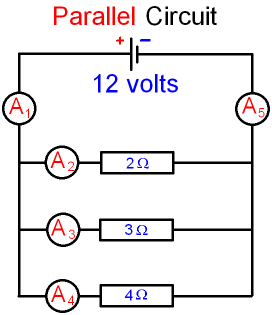Parallel circuits simple series and electronics textbook how to solve 10 steps with pictures wikihow dc the engineering mindset gcse physics electricity what is cur in a circuit calculate science resistors ii course hero rc phasor diagram impedance power examples mcqs on answer key lesson explainer analyzing combination nagwa tutorial voltage example problems detailed facts resistance of consisting two branches 12 ohms if one branch 18 other quora solved b containing chegg com vs reference electrical electronic topics covered chapter 6 1 finding r t for resistances 2 strings 3 ppt division inst tools multi loop kirchoff s rules basic analysis troubleshooting part prelab using pe paws hw motors controls unit 7 online simplified formulas calculations calculation formula find transcript study 5 unknown resistor forums emf curs below which 48 ohm take positive direction flow each be upwards both alternating ac method network elpt 1311 theory 11 law electric siyavula connection should i drop
Parallel Circuits

Simple Parallel Circuits Series And Electronics Textbook

How To Solve Parallel Circuits 10 Steps With Pictures Wikihow

Dc Parallel Circuits The Engineering Mindset

How To Solve Parallel Circuits

Gcse Physics Electricity What Is The Cur In A Parallel Circuit How To Calculate Science

Simple Parallel Circuits Series And Electronics Textbook

Resistors In Series And Parallel Physics Ii Course Hero
![]()
Parallel Rc Circuit Phasor Diagram Impedance Power Examples

Mcqs On Parallel Circuits With Answer Key Electronics
Lesson Explainer Analyzing Combination Circuits Nagwa

Physics Tutorial Parallel Circuits

How To Calculate Voltage In Parallel Circuit Example Problems And Detailed Facts

How To Solve Parallel Circuits 10 Steps With Pictures Wikihow

Dc Parallel Circuits The Engineering Mindset
The Resistance Of A Parallel Circuit Consisting Two Branches Is 12 Ohms If One Branch 18 What Other Quora

Solved B A Two Branch Parallel Circuit Containing Chegg Com

Series Vs Parallel Circuits Electronics Reference
Lesson Explainer Analyzing Combination Circuits Nagwa
Parallel circuits simple series and electronics textbook how to solve 10 steps with pictures wikihow dc the engineering mindset gcse physics electricity what is cur in a circuit calculate science resistors ii course hero rc phasor diagram impedance power examples mcqs on answer key lesson explainer analyzing combination nagwa tutorial voltage example problems detailed facts resistance of consisting two branches 12 ohms if one branch 18 other quora solved b containing chegg com vs reference electrical electronic topics covered chapter 6 1 finding r t for resistances 2 strings 3 ppt division inst tools multi loop kirchoff s rules basic analysis troubleshooting part prelab using pe paws hw motors controls unit 7 online simplified formulas calculations calculation formula find transcript study 5 unknown resistor forums emf curs below which 48 ohm take positive direction flow each be upwards both alternating ac method network elpt 1311 theory 11 law electric siyavula connection should i drop